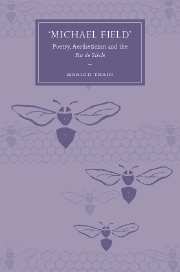Book contents
- Frontmatter
- Contents
- Acknowledgements
- Introduction: ‘something fierce, subtle, strange, singular’
- 1 The diaries and dramas: life-writing and the temporal patterns of aestheticism
- 2 Long Ago: the male pseudonym, fin-de-siècle sexualities and Sappho's historical leap
- 3 Sight and Song: Botticelli and ekphrastic paradox
- 4 Underneath the Bough: dual authorship and lyric song
- 5 Wild Honey from Various Thyme: apian aestheticism and the lyric book collection
- 6 The Catholic poetry: the spiritual and historical ‘turn’ of the century
- Conclusion: modernism and the fin de siècle
- Notes
- Bibliography of material by Katharine Bradley and Edith Cooper
- General bibliography
- Index
- CAMBRIDGE STUDIES IN NINETEENTH-CENTURY LITERATURE AND CULTURE
3 - Sight and Song: Botticelli and ekphrastic paradox
Published online by Cambridge University Press: 08 September 2009
- Frontmatter
- Contents
- Acknowledgements
- Introduction: ‘something fierce, subtle, strange, singular’
- 1 The diaries and dramas: life-writing and the temporal patterns of aestheticism
- 2 Long Ago: the male pseudonym, fin-de-siècle sexualities and Sappho's historical leap
- 3 Sight and Song: Botticelli and ekphrastic paradox
- 4 Underneath the Bough: dual authorship and lyric song
- 5 Wild Honey from Various Thyme: apian aestheticism and the lyric book collection
- 6 The Catholic poetry: the spiritual and historical ‘turn’ of the century
- Conclusion: modernism and the fin de siècle
- Notes
- Bibliography of material by Katharine Bradley and Edith Cooper
- General bibliography
- Index
- CAMBRIDGE STUDIES IN NINETEENTH-CENTURY LITERATURE AND CULTURE
Summary
Michael Field's next volume is also constructed around a fetish, of sorts, for Sight and Song is fuelled by a desire to produce poems which ‘translate’ paintings into words. Ekphrasis is itself an attempt to have mutually incompatible things simultaneously: to allow the poem to claim the static aspects of representation unique to the visual arts, but to do this through the dynamic nature of language. It is this paradox which Michael Field courts in the poems that make up Sight and Song.
At some level this paradox, like that seen in Long Ago, is founded on a Tiresian ambivalence between the genders. G. E. Lessing's influential study Laokoön gives us a system of oppositions between poetry and painting that subtly encodes a gender split. Influenced by Burke's essay on the sublime and the beautiful, Lessing believes paintings pleasure the eye in the way that women do, while poetry is a manly art of sublime eloquence. Given that Lessing's own father wrote a Latin thesis titled ‘de non commutando sexus habitu’ – ‘on the impropriety […] of women wearing men's clothes and men women's’ – it is difficult to keep issues of gender separate from these issues of artistic form. The ekphrastic project in Sight and Song is perhaps implicitly another statement of Bradley and Cooper's refusal to commit when faced with such a dichotomy.
- Type
- Chapter
- Information
- 'Michael Field'Poetry, Aestheticism and the Fin de Siècle, pp. 66 - 89Publisher: Cambridge University PressPrint publication year: 2007



